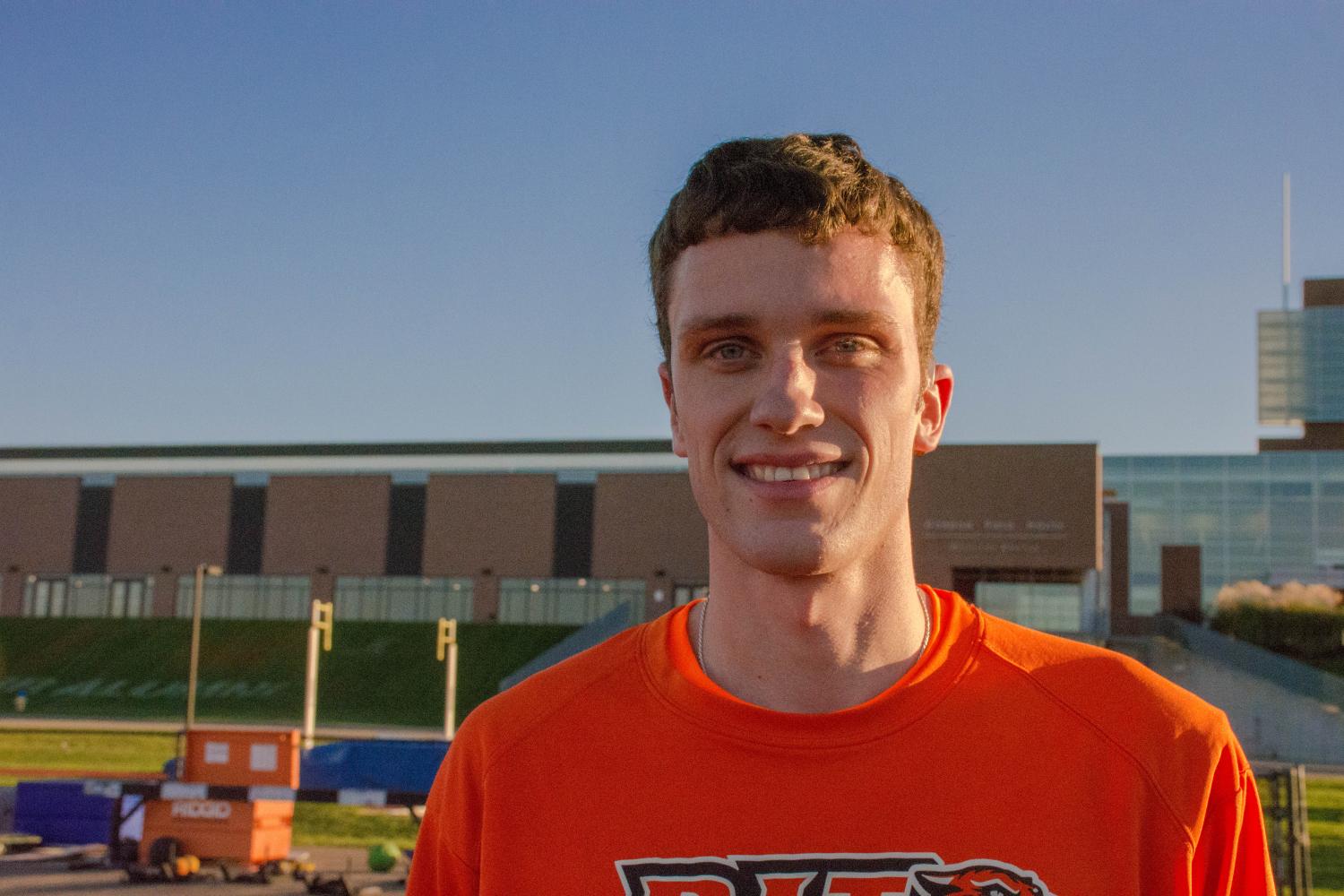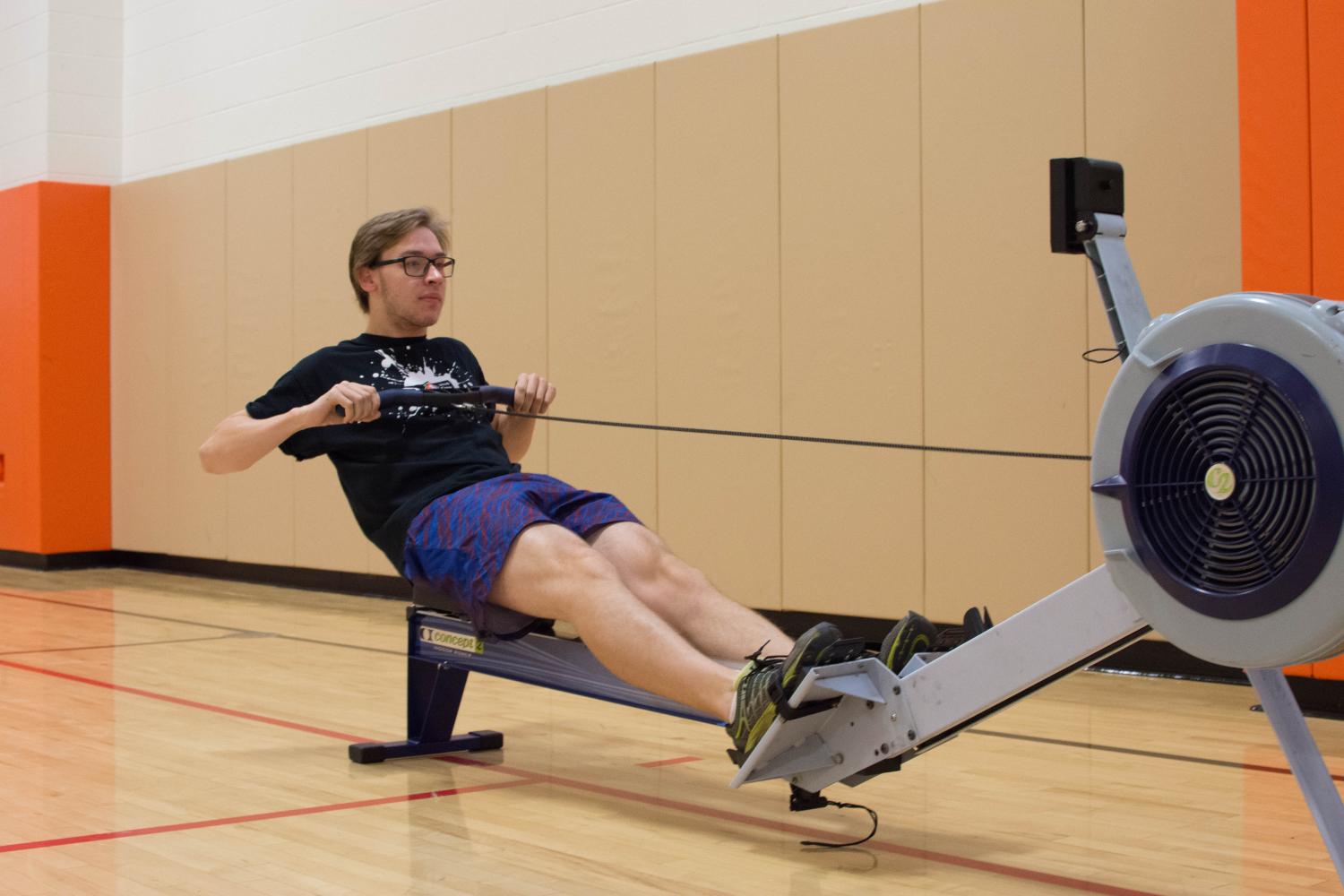On the Roster: Deaf and Hard-of-Hearing Athletes
by Samantha Wagner | published Dec. 2nd, 2016
A newer program has started to plant its roots in the middle of RIT athletics, making the competitive world of varsity sports even more accessible to all students. In the past couple of years, the RIT/NTID Athletic Development Program has worked with RIT varsity coaches, NTID faculty and staff and, of course, the athletes themselves to help ensure greatness on and off the field, court or track.
At the moment, the program works with about 15–18 Deaf and hard-of-hearing athletes. As Athlete Development program coordinator, Skip Flanagan is the primary support service for these athletes. He, along with the program, offers a wide range of different services including academic help, sports medicine and educational workshops for the teams and coaches. Most importantly, there is one-on-one support offered at any time.
“An individual athlete might come to me to figure out what’s the best fit for them, what they want, and I try my best to provide whatever’s needed,” signed Flanagan.
Every athlete is different, and thus each athlete needs something different than the next. The programs are set in place to help meet the needs of every single one.
“Mostly it’s support I get from [Flanagan],” signed second year volleyball player and Applied Arts and Science major Alana Smith. “If I have a struggle, I will go to him, and we will talk about it and figure out a way to get rid of the issue.”
Fourth year Electrical Engineering major and a member of the men's crew team Andre Webster also commented on the program and Flanagan's help. "He's been really instrumental and helping me get what I need and helping other Deaf and hard-of-hearing athletes in their programs," he said.
All of these resources are put into place because being a Deaf or hard-of-hearing athlete is challenging. This program tries to help the athletes succeed through all their different obstacles.
“We have to work two times harder than anybody else on any sports team,” explained second year Accounting major Bradley Morissette, who jumps for the track and field team.
One of the biggest challenges Deaf and hard-of-hearing athletes face is the feeling of isolation. While no team seeks to intentionally exclude its fellow members, sometimes these athletes can feel left out due to the communication barrier. It is easy for the hearing athletes to sometimes forget about the situation.
“For some of the Deaf and hard-of-hearing athletes, it tends to be tough to really bond with the team or even bond with the coaches,” signed Flanagan.
For that reason, it is up to both sides to work together and solve this issue.
“I struggled to be a part of the team. The lack of chemistry was difficult in the beginning,” signed Smith. “Now I am integrated with the team. I think it’s just developing the bond over time.”
Flanagan agreed with Smith on this matter. “Sometimes they aren’t used to a new person coming in, but they’re not resistant to it,” he signed. While it might take a little time to adjust to the new circumstances, that does not usually stop it from working out.
Morissette found this to be the case with his team, mentioning that teammates are often willing to learn sign.
One of Flanagan's responsibilities is to help the athletes and their teams get through this key adjustment period together. “That’s my role,” he signed. “I get involved and teach the staff how to figure out which kinds of communication tools or methods work best for each individual athlete.”
One of the things Flanagan and the program does is give out sign cards with the alphabet to all the coaches and players. Flanagan has also provided workshops for both the coaches and captains of the teams to teach them how to improve their team dynamics and communication.
Sometimes the athletes even take matters into their own hands. For example, Smith is teaching her volleyball team a new sign every day. “They are learning ASL and are practicing it with me,” signed Smith. “Everybody is always excited to learn a new sign.”
This receptiveness and willingness to change goes a long way in ensuring each athlete's success. “[RIT] is one of the most inclusive universities I’ve ever seen in the country, perhaps in the world,” signed Flanagan.
Despite the different challenges, the athletes report that their experiences and achievements have made the effort well worth it.
“When I do get the opportunity to play, that’s when it really hits me the most,” signed Smith, describing her time on the volleyball court. “When I get to play, I get the hugest amount of support from the team.”
Smith reported that her team is always there cheering her on and showcasing their support for her and all her abilities. She described how they are all up screaming and have smiles on their faces whenever she is put in.
“It doesn’t matter if I make a mistake, they are still so supportive,” signed Smith. “They welcome me on the team, and that’s what really matters.”
“It doesn’t matter if I make a mistake, they are still so supportive,” signed Smith. “They welcome me on the team, and that’s what really matters.”
The feeling of making that game-winning goal, stealing the ball from the opposing team, beating your own personal record in the water or on the track or making that perfect block should not be limited to hearing athletes. Flanagan and his program make sure that these cherished moments are possible for anyone.
“Worrying about your hearing loss or how you may be at a disadvantage should be at the back of your mind,” said Webster. “Just work hard and everything will fall into place.”
Ultimately, the NTID athletic development program is there to help and support all Deaf and hard-of-hearing athletes. “Looking back at my season, I’m so glad I joined the crew program. I got a chance to see what I’ve accomplished in just a few short months,” explained Webster. “It never could have happened without the support of a fantastic NTID athletic program and the best coaches and teammates one could ever ask for.”




